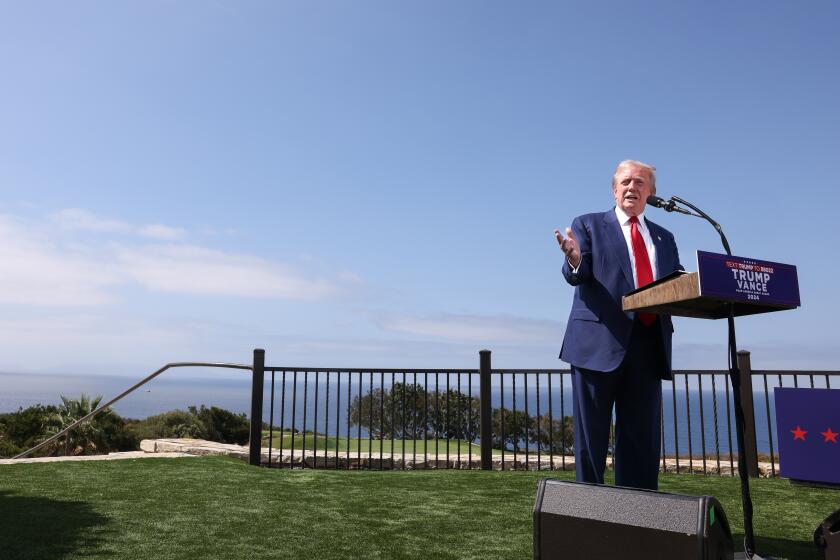Lawmakers get private surge pitch
President Bush began a weeklong hard sell of his new Iraq policy Monday, meeting with groups of senators at the White House in an effort to convince them that the best way to bring U.S. troops home from Iraq is to send more, at least for a while.
Some said the president accomplished that goal; others said he did not.
“Iraq is the central front in the global war against radical Islamic terrorism. If we abandon that nation today, we risk the very same situation that gave rise to the Taliban in Afghanistan and one that created a safe harbor for terrorists like Al Qaeda to plan attacks against our people,” said Sen. John Cornyn (R-Texas), a member of the Senate Armed Services Committee who attended one of the meetings.
“I’m not for the surge,” said Sen. Gordon H. Smith (R-Ore.), who attended another. “Does political process beget security or does security beget political process?
“I think he understands that he’s betting his presidency, his place in history, on this coming out well.”
Bush did not detail the proposal he will lay out Wednesday evening, senators said. But Smith said the president appeared to be planning to send 20,000 additional troops to Iraq, primarily to stop sectarian violence and foster a better climate for political reconciliation.
“It was clear to me that a decision was made for a surge of 20,000 additional troops,” said Smith, who also serves on the Armed Services Committee. “He did not affirm that that would be the number, but he said roughly ... that amount. I understood it as a hypothetical.”
Sen. Lindsey Graham (R-S.C.), who supports a troop increase and is also on the committee, said Bush “understands that giving the Iraqis the ability to stabilize their government ... is not an unending commitment by the American people.”
But Graham said Bush believed that setting a timeline would be a mistake.
“He’ll be supportive of benchmarks, but not timetables,” Graham said.
The outcome of November’s election -- in which public dismay over the war led to large Republican congressional losses -- has put the administration under increasing pressure to withdraw U.S. forces from Iraq.
That pressure was heightened by the report of the Iraq Study Group, also known as the Baker-Hamilton commission, which called for troops’ return to start by 2008.
Instead, military leaders and the White House have begun to argue for a troop increase, which they say will turn the tide against the insurgency.
Critics deride the “surge,” as it is known in Washington, as an escalation that will lead to more American deaths.
In his meetings Monday, Bush made his case for the surge, arguing that it was more likely than previous plans to work because it was drafted by Iraqi Prime Minister Nouri Maliki and his government.
In particular, Smith said, Maliki is to pledge a specific number of Iraqi troops, reduce factionalism in his own forces and stop shielding key Shiite militia leaders.
The troop increase “is based on the president’s belief that the political processes have been overtaken by sectarian violence, and sectarian violence needs to be quelled so political processes can be restored,” Smith said. “It is his faith in Prime Minister Maliki that leads him to tack into the winds of American public opinion.”
Smith is one of a number of moderate Republicans who are skeptical of the president’s plan. Most Democrats oppose it.
Bush is expected to meet with more members of Congress today.
“My own sense is that what is driving the president is his belief that this is winnable -- that the Iraqis are now coming to the table to keep their part of the bargain and that ultimately the American people want victory and a way forward to success,” Smith said.
“He hopes to lay out a path to that success [Wednesday] night that will rewin the support of the American people. There are a lot of ifs in that.”
On Thursday, Bush plans to fly to Ft. Benning, Ga., the home of Army infantry, to visit with soldiers.
White House Press Secretary Tony Snow said that despite the opposition of House Speaker Nancy Pelosi (D-San Francisco) and Senate Majority Leader Harry Reid (D-Nev.) to an increase in troops, they and the president were not necessarily headed for collision.
He suggested that when the scope and details of the plan became known, some criticism might be toned down. He took issue with the idea that the speech represented Bush’s last chance to win support for the war.
Bush understands, Snow said, that “there’s a real sense of urgency within the United States for assurance” that the administration has a plan for Iraq that will boost American security, and that Iraqis will take “leading positions sooner rather than later.”
*
Times staff writers James Gerstenzang and Paul Richter contributed to this report.
More to Read
Get the L.A. Times Politics newsletter
Deeply reported insights into legislation, politics and policy from Sacramento, Washington and beyond. In your inbox three times per week.
You may occasionally receive promotional content from the Los Angeles Times.










